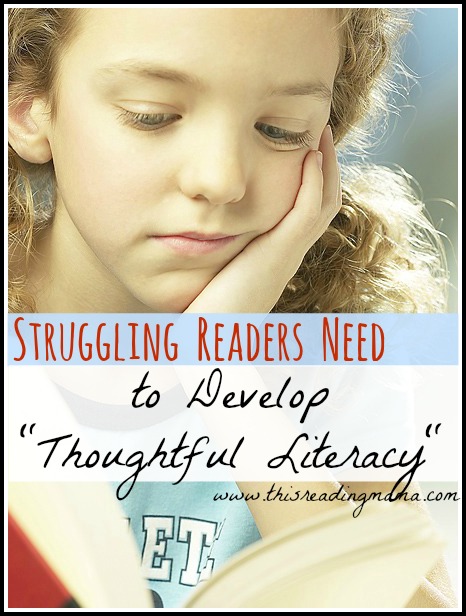
*This post contains affiliate links. To learn more about this, please read my disclosure policy.
Hi and welcome to This Reading Mama! I’m on week 7 of a 10-week series focused on struggling readers. Many of these ideas come from my experience with struggling readers as a private reading tutor and also from the book, What Really Matters for Struggling Readers by Richard Allington Please click HERE on the image above to read the introduction and weeks 1-6.
Thoughtful Literacy Starts with the Teacher
You’ve just finished The Help. You rush upstairs, pull out your arts and crafts bins and begin working on a diorama, right? No? Okay, you rush to your computer to find an AR test you can take. No way? I’ve got it! You call up a friend who’s read it and begin to quiz her: Who was the author? From whose perspective is chapter 3 told? Sounds ridiculous, right?
So what do we, as readers, naturally do when we are reading (or finished reading) books? We talk about it, we recommend the book to others, discuss the confusing parts with those who are reading, offer our theories as to why things are happening like they are in the book, or maybe even critique the author’s style. Let’s allow our struggling readers do the same.
I really like the way Richard Allington phrases it in What Really Matters for Struggling Readers: Struggling readers need to develop “thoughtful literacy”. In other words, we need to allow our struggling readers to THINK and TALK about what they’ve read. Thoughtful literacy starts with us, as the teacher.
First, I want to tell you what I am NOT saying. I am not saying that we should never assign our kids a project or comprehension test after reading a text. But we DO want to be careful that we are asking them to think about what they’ve read…that we’re asking them to interact with the text in a meaningful way. Here are a couple of great points Allington makes about thoughtful literacy, which are really first cousins:
Remembering vs. Understanding the Text
While there is a link between remembering and understanding, just because you remember something doesn’t mean you understand it. If I read my husband’s engineering textbooks from college, I might remember a random math formula, but it doesn’t mean I understand it. On the flip side, “it is entirely possible for us to understand a story without remembering all of the details.” (116) We may not remember the name of a person in the text, but we can still discuss him/her as a character with our friend. Allington goes on to say that when we focus too much on having struggling readers simply remember facts, it can actually have negative impacts on their understanding of the text.
Asking Known-Answer Questions vs. Asking Thoughtful Questions
I love this idea! How ludicrous would it sound to have a known-answer conversation with a good friend like this: “What’s the name of your husband?” After your friend replies, you say, “Good job. Kiss your brain. You’re a genius. Now, you get a sticker.” In real life, we don’t converse in such a manner. But we do very often with struggling readers. “Who was the author?” “What is the title?” “Who was the main character?” Student replies…here’s your sticker.
Now again, I am not saying that these things shouldn’t be taught. Kids need to be able to retell what they’ve read and a good retelling does include important things such as the main character (read more about that here). But so frequently, struggling readers are ready to move beyond the basics into thoughtful questions and we stop here.
What are Thoughtful Questions?
And just what is a thoughtful question? Any type of question that gets a conversation going between you and the child. I like to ask questions that begin with “In your opinion…”, “What do you think about…”, or “What did this part mean to you…”. I also like to steer clear of asking the question in such a manner that the child feels I am only looking for one answer. I’ve been under teachers before who ask a question and as people give meaningful answers, she disregards those answers because it’s not the answer she was looking for. Pretty soon, no one wants to answer her questions. Our struggling readers are no different. For more info on asking thoughtful questions, please visit my post: How to Ask Questions to Check Comprehension.
While we can’t take away the tests or even the occasional project, we want to make sure that our struggling readers get a fair chance of connecting with the text in meaningful ways. That they can discuss, debate, respond, react, and evaluate the texts they read with their peers and with you. This quote from Allington really sums it up. “Thoughtful literacy is more than remembering what the text said. It is engaging the ideas in the texts, challenging those ideas, reflecting on them, and so on. It is responding to the story with giggles, goosebumps, anger, or revulsion.” (135)
Okay, I think I’ll let you get back to your diorama. It is, after all, due tomorrow. 🙂
~Becky
Leave a Reply